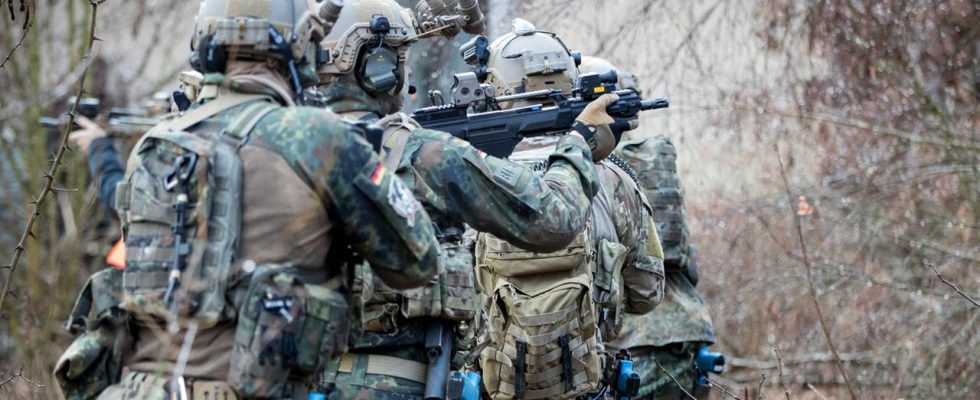exclusive
The ammunition affair at the KSK occupied federal politics for weeks. But even years later, fundamental questions remain unanswered. The responsible court has still not decided whether to admit charges.
It was a veritable affair and it made headlines across the country: When it became known in 2021 through investigative research that Bundeswehr soldiers from the elite KSK unit were apparently allowed to return ammunition on a large scale with impunity that they had previously embezzled. The political tremor reached right up to the top of the Federal Ministry of Defense in Berlin.
The then minister, Annegret Kramp-Karrenbauer (CDU), had to explain to the Defense Committee in the Bundestag why parliamentarians had only learned about a controversial amnesty campaign by the Bundeswehr from the press. And in Baden-Württemberg, the Tübingen public prosecutor’s office began investigating the then commander of the Special Forces Command (KSK), Markus Kreitmayr, who is said to have commanded the operation.
This was also a political issue because the respected brigadier general was considered a confidant of the minister – and had been specifically sent by her to the scandal-proven problem barracks in Calw, Baden-Württemberg, to clean up the place.
Two years have passed since then. But many questions are still unresolved – and are still legally pending. The reason: Although the Tübingen public prosecutor’s office brought charges against the then KSK commander in February 2022 after extensive investigations, the responsible regional court in Tübingen has still not decided whether to allow the charges and thus lead to a trial in the explosive matter comes. A spokesman confirmed this when asked by WDR and NDR.
Affair with political explosiveness
“The burden on the responsible chamber,” said a court spokesman, “with detention and placement matters that need to be processed as a priority, continues to be very high.” This means that one of the most important investigative complexes within the Bundeswehr remains open, as does the question of who bears legal responsibility for the KSK’s handling of ammunition that may have previously been embezzled on a massive scale.
The collection campaign by the special forces command, which has repeatedly made the headlines, was also politically explosive in several respects: In 2017, investigators from the Federal Criminal Police Office had already searched the KSK barracks in Calw, Baden-Württemberg, for illegally hoarded ammunition. They had received information that soldiers wanted to set up the barracks area as a so-called “safe house” in the event of “Day X”. However, they didn’t find anything.
But the investigative authorities continued to keep the elite unit and its soldiers in their sights. In May 2020, they finally found boxes of ammunition and two kilos of plastic explosives from Bundeswehr stocks in the garden of a KSK soldier, as well as an SS songbook and postcards with a swastika. While they were still investigating the KSK soldier, the command at the KSK in Calw decided on an unconventional ammunition collection operation.
Kreitmayr should reorganize the KSK
In view of an upcoming ammunition inventory, it apparently became clear that tens of thousands of rounds of ammunition were missing from the barracks – a difficult finding, not least given the public debate. In Berlin, members of the Bundestag have long wanted to know how the Bundeswehr’s repeatedly noticeable shortages of ammunition could be explained.
In any case, in Calw, the soldiers at the KSK were now given the opportunity to return so-called “found ammunition” “without having to fear negative consequences,” as internal documents say WDR and NDR could see. There was also talk of an “amnesty” in the documents.
The result: The collection campaign is said to have resulted in more ammunition than was previously missing. Among other things, a hand grenade. Their embezzlement is a clear violation of the War Weapons Control Act. However, law enforcement agencies learned about this much later – from the press.
Justice was left out
The promised “amnesty” couldn’t happen anyway. In Germany, the judiciary is responsible for prosecuting crimes, not the military command. And so the amnesty affair ultimately brought the public prosecutor’s office into action, which brought charges against Kreitmayr after completing its investigation.
She accuses the commander of “failure to cooperate in criminal proceedings” according to Section 40 of the Military Criminal Law and brought charges before the regional court due to the “particular scope and special significance of the proceedings”. However, the decision on approval has still not been made. Kreitmayr, who sees himself wrongly accused, is also likely to have an interest in clarifying the allegations against him.
Kreitmayr’s lawyers reject the allegations as “factually and legally unfounded.” According to the lawyers, the collection campaign was carried out “under emergency considerations”. Kreitmayr also had no evidence of crimes in his association. In addition, it was never about a cover-up of crimes.
When asked, a spokeswoman for the Ministry of Defense did not want to comment on what impact the now very long duration of the proceedings would have on possible disciplinary proceedings against the high-ranking general.


